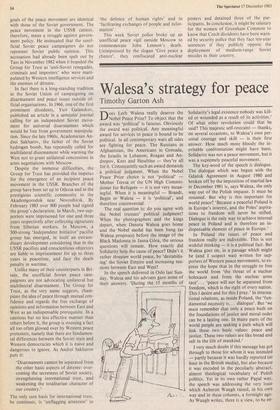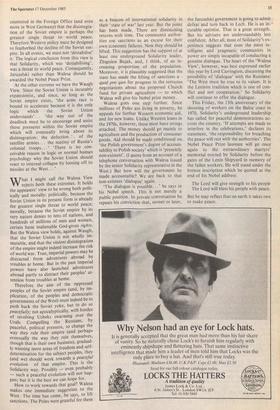Walesa's strategy for peace
Timothy Garton Ash
Does Lech Walesa really deserve the Nobel Peace Prize? To object that the award was 'political' is fatuous. Obviously the award was political. Any meaningful award for services to peace is bound to be political. In all contemporary wars all sides are fighting for peace. The Russians in Afghanistan, the Americans in Grenada, the Israelis in Lebanon; Reagan and An- dropov, Kent and Heseltine — they're all for it. Consequently such an award demands a political judgment. When the Nobel Peace Prize choice is not 'political' Mother Teresa or the UN High Commis- sioner for Refugees — it is not very mean- ingful. When it is meaningful — Brandt, Begin or Walesa — it is `political', and therefore controversial.
The real question is: do you agree with the Nobel trustees' political judgment? When the photographers and the kings depart, when Danuta Walesa goes home and the Nobel medal has been hung (as Walesa proposes) before the image of the Black Madonna in Jasna G6ra, the serious questions will remain. How exactly did Solidarity help the cause of peace? Didn't it rather threaten world peace, by 'destabilis- ing' the Soviet Empire and increasing ten- sions between East and West?
In the speech delivered in Oslo last Sun- day, Walesa and his advisers gave some of their answers. 'During the 15 months of Solidarity's legal existence nobody was kill- ed or wounded as a result of its activities.' Of what other revolution could that be said? This majestic self-restraint — thanks, on several occasions, to Walesa's own per- sonal courage and skill — is their first answer. How much more bloody the in- evitable confrontation might have been. Solidarity was not a peace movement, but it was a supremely peaceful movement.
The key-word of the speech is dialogue. The dialogue which was begun with the Gdansk Agreement in August 1980 and broken off by the imposition of martial law in December 1981 is, says Walesa, the only way out of the Polish impasse. It must be resumed. But why is this important for world peace? `Because a peaceful Poland is in Europe's interest, and the Poles' aspira- tions to freedom will never be stifled. Dialogue is the only way to achieve internal peace in Poland and is therefore an in- dispensable element of peace in Europe.'
In Poland the issues of peace and freedom really are indivisible. This is not wishful thinking — it is a political fact. But Walesa goes on, in a passage which might be (and I suspect was) written for sup- porters of Western peace movements, to ex- press the hope that in the struggle to free the world from 'the threat of a nuclear holocaust and from the nuclear arms race'... 'peace will not be separated from freedom, which is the right of every nation. This I desire and for this I pray.' In interna- tional relations, as inside Poland, the 'fun- damental necessity is... dialogue'. But 'we must remember that only a peace built on the foundations of justice and moral order can be a lasting one. In many parts of the world people are seeking a path which will link these two basic values: peace and justice. These two values are like bread and salt in the life of mankind.'
I very much doubt if this message has got through to those for whom it was intended — partly because it was hardly reported (at least in the British media), but also because it was encoded in the peculiarly abstract, almost theological vocabulary of Polish politics. Yet in its own rather Papal way, the speech was addressing the very issue which Auberon Waugh raised, in his own way and in these columns, a fortnight ago. As Waugh writes, there is a view, to be en-
countered in the Foreign Office (and even more in West Germany) that the disintegra- tion of the Soviet empire is perhaps the greatest single threat to world peace. Therefore Western policy must be designed to featherbed the decline of the Soviet em- pire. In all events, we must not 'destabilise' it. The logical conclusion from this view is that Solidarity, which was 'destabilising', was a threat to world peace. Consequently, Jaruzelski rather than Walesa should be awarded the Nobel Peace Prize.
At the other extreme we have the Waugh View. Since the Soviet Union is incurably expansionist, and since, so long as the Soviet empire exists, 'the arms race is bound to accelerate because it is the only
logic which the Soviet Union understands' ... 'the way out of the deadlock must be to encourage and assist those pressures within the Soviet empire which will eventually bring about its disintegration: the defection. : . of the satellite armies. . . the mutiny of Russia's colonial troops... "There is no con- ceivable reason in logic or normal human psychology why the Soviet Union should react to internal collapse by loosing off its missiles at the West ... '
What I might call the Walesa View rejects both these extremes. It holds the appeasers' view to be wrong both polit- ically and morally: politically, because the Soviet Union in its present form is already the greatest single threat to world peace; morally, because the Soviet empire by its very nature denies to tens of nations, and hundreds of millions of men and women, certain basic inalienable God-given rights. But the Walesa view holds, against Waugh, that the Soviet Union is not wholly im- mutable, and that the violent disintegration of the empire might indeed increase the risk of world war. True, imperial powers may be distracted from adventures abroad by troubles at home. But in the past imperial powers have also launched adventures abroad partly to distract their peoples' at- tention from troubles at home.
Therefore the aim of the oppressed peoples of the Soviet empire (and, by im- plication, of the peoples and democratic governments of the West) must indeed be to push back the Soviet yoke, but to do so peacefully; not apocalyptically, with hordes of revolting Uzbeks swarming over the Urals. Compelling the Russians, by peaceful, political pressure, to change the way they rule their empire (and perhaps eventually the way they rule themselves, though that is their own business), gradual- ly winning more areas of freedom and self- determination for the subject peoples, they (and we) should work towards a peaceful evolution of that empire. This is the Solidarity way. Possibly — even probably — such a peaceful evolution will not hap- pen; but it is the best we can hope for.
How to work towards that goal? Walesa makes one immediate suggestion to the West. The time has come, he says, to lift sanctions. The Poles were grateful for them
as a beacon of international solidarity in their 'state of war' last year. But the point has been made. There are diminishing returns with time. The communist author- ities use sanctions as an excuse for their own economic failures. Now they should be lifted. This suggestion has the support of at least one underground Solidarity leader, Zbigniew Bujak, and, I think, of an in- creasing proportion of the population. Moreover, it is plausibly suggested that the state has made the lifting of sanctions a quid pro quo for progress in the tortuous negotiations about the proposed Church fund for private agriculture — to which Walesa will give his Nobel prize money.
Walesa goes one step further. Since millions of Poles are living in poverty, he appeals for further Western economic aid, and for new loans. Unlike Western loans in the 1970s, however, these must have strings attached. The money should go mainly to agriculture and the production of consumer goods. Aid should be made conditional on 'the Polish government's degree of accoun- tability to Polish society' which is 'presently non-existent'. (I quote from an account of a telephone conversation with Walesa issued by the senior Solidarity representative in the West.) But how will the government be made accountable? We are back to that non-existent 'dialogue' again.
'The dialogue is possible...' he says in his Nobel speech. This is not merely a public position. In private conversation he repeats his conviction that, sooner or later, the Jaruzelski government is going to admit defeat and turn back to Lech. He is an in- • curable optimist. That is a great strength. But his advisers are understandably less confident. After all, most of Solidarity's ex- perience suggests that even the most in- telligent and pragmatic communists in power are simply incapable of conducting a genuine dialogue. The heart of the 'Walesa View', however, was best expressed earlier this year by Lord Carrington, discussing the possibility of 'dialogue' with the Russians: 'The West must be true to its values. It is the Leninist tradition which is one of con- flict and not cooperation.' So Solidarity will continue to offer the dialogue.
This Friday, the 13th anniversary of the shooting of workers on the Baltic coast in 1970, Solidarity's underground leadership has called for peaceful demonstrations ac- cross the country. 'If attempts are made to interfere in the celebrations,' declares its statement, 'the responsibility for breaching the peace will rest with the authorities'. The Nobel Peace Prize laureate will go once again to the extraordinary martyrs' memorial erected by Solidarity before the gates of the Lenin Shipyard in memory of the fallen workers. He will stand under the bronze inscription which he quoted at the end of his Nobel address: The Lord will give strength to his people The Lord will bless his people with peace.
But he may reflect that on earth it takes two to make peace.







































































 Previous page
Previous page